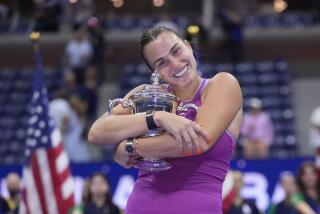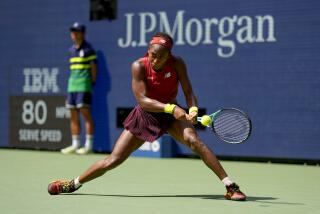Ryan Harrison enjoys a warm embrace from U.S. Open crowd
- Share via
From New York — Like a newborn, which is what he is in the world of professional tennis, Ryan Harrison was gathered up in their arms and coddled by the crowd on the Grandstand court at the U.S. Open.
Hours earlier, fewer than 20% of them were likely to have heard of him. Some wandered over to the Grandstand because it is a kind of funky place to watch tennis. Others probably saw an American was playing and had the parochial response.
By late afternoon Friday, they were groupies, several thousand of them, yelling and screaming and hanging from the rafters of the venerable old court, which has always appeared to be little more than an architectural afterthought, a kind of coincidental conjoined twin to Louis Armstrong Stadium. They had adopted Harrison, 18, had fallen in love with the fresh face, the cute smile and floppy brown hair, and were ready, by the very force of their numbers, to pull him to yet another improbable victory.
This is what the first week of a U.S. Open is about. The big names and eventual winners must survive the upstarts, and an occasional upstart — such as Melanie Oudin last year — can make a name.
Oudin went further, but Harrison’s two-match uprising had its moments. The first was Harrison’s first-round upset of Ivan Ljubicic, the aging Croat who once won a Davis Cup nearly all by himself and probably had his last hurrah with an improbable title run at Indian Wells this year.
That brought Harrison to the Grandstand.
Harrison, of New Braunfels, Texas, 6 feet and 160 pounds, ranked No. 220 in the world and resembling the kid who serves you at McDonald’s, was playing an unheralded but red-hot Sergiy Stakhovsky of Ukraine. Stakhovsky is 24, ranked No. 36 and has won four ATP titles, the most recent Sunday at the Pilot Pen in New Haven, Conn. He’s not Roger Federer but is a good pro.
So when young Harrison took a one-set lead by winning the third, 6-3, the buzz became a roar. Ryan Harrison was now “our Ryan.”
Of course his chances were slim. He needed to win three qualifying matches to get into the main draw. He had tried to qualify for the U.S. Open and failed in 2008 and 2009. His only Grand Slam match was a first-round loss in this year’s Australian Open.
Stakhovsky forced it to a fifth set and the Grandstand became the Fourth of July.
Asked later about the crowd, Stakhovsky, who kept a sense of humor throughout, said, “It was nice, I mean, except that 99.9% of the people were against me.”
By the end of four sets, they had played nearly three hours and the good stuff was still to come. Stakhovsky went up a break and Harrison got it back. After that, it looked and felt like a tiebreaker, and that’s what came to pass.
The crowd tried to will a victory, chanting, “Ryan, Ryan, Ryan.”
Harrison said later, “That was incredible … they were great … there were some balls that I ran down and was able to scoop up and get back in the point, win some points, just because of that energy and electricity.”
It really got electric when Stakhovsky double-faulted, giving Harrison a 4-3 lead in the tiebreaker. Then Harrison hit a service winner, Stakhovsky netted a backhand and Harrison had three match points. Wave the Stars and Stripes and serve the apple pie.
But then Cinderella’s slipper fell off, and after Stakhovsky saved two match points and Harrison double-faulted at 6-5, the several thousand Ryan Rooters were left to watch in quiet depression as Stakhovsky served and volleyed on match point and punched his forehand into a wide-open court. The crowd had been so into it that this might have marked the first time the players finished less sweaty than the fans.
It had taken 4 hours 13 minutes. Stakhovsky had won, 6-3, 5-7, 3-6, 6-3, 7-6 (6).
“Looking back on it, it was a great experience,” Harrison said. “ … I’m trying, hopefully, to get in the top 10, so I feel like one match doesn’t make or break me. It’s the experience of playing these types of matches.”
Harrison is well-spoken and apparently well-grounded.
“My dad has been a great role model for my entire life,” he said.
A star may not have been born out on the Grandstand, but several thousand people would say that a nice tennis career was hatched.
bill.dwyre@latimes.com
More to Read
Go beyond the scoreboard
Get the latest on L.A.'s teams in the daily Sports Report newsletter.
You may occasionally receive promotional content from the Los Angeles Times.











